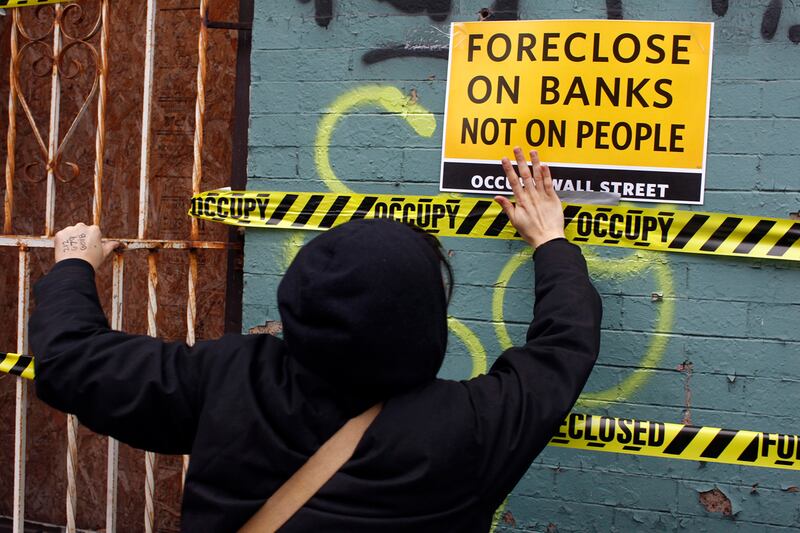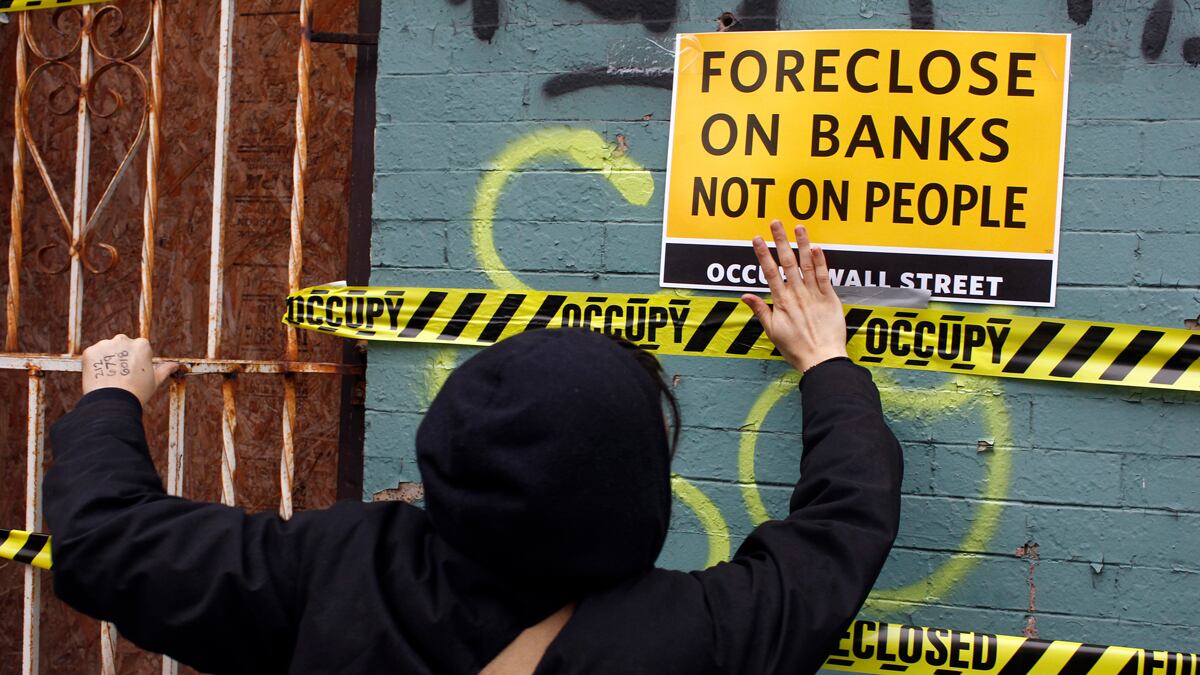On Tuesday afternoon, Tasha Glasgow, an intermittently homeless 30-year-old mother of two, walked out the front door of the foreclosed Brooklyn house that Occupy Wall Street activists had seized for her and marveled at the hundreds of people outside, cheering in the rain. Clusters of balloons and “Welcome Home” signs adorned the tiny front yard. Zuccotti Park veterans in hardhats decorated with anarchist symbols trooped in with cleaning supplies, beginning a multi-day renovation. Someone hooked up a generator, lighting up Glasgow’s new Christmas tree. Several city councilmen stood on the porch with housewarming gifts.
Glasgow climbed up a stepladder so the throngs on Vermont Avenue in East New York, the Brooklyn neighborhood with the city’s highest foreclosure rate, could see her. “I love everybody,” she said quickly. “I’m kind of shy. Thank you.”
This punk-rock version of Extreme Makeover: Home Edition marked the start of a new phase of Occupy Wall Street, as activists nationwide merged civil disobedience with practical action addressing the foreclosure crisis. Occupy Our Homes, as the new wave of demonstrations was called, brought people to the streets in more than 20 states. In California, the Los Angeles Times reported that 75 people gathered at the South Gate home of a woman who suffers from cerebral palsy and recently underwent a double mastectomy, and whose home went into foreclosure after she defaulted by $17,998. Then they took a bus to Riverside, where they helped a factory manager move back into a home that JPMorgan Chase took last month. In Chicago, The Atlantic Wire reported that activists moved into a house whose owner had walked away from her mortgage, leaving it to be ransacked. In Atlanta, demonstrators disrupted foreclosure auctions.
Unlike the Zuccotti Park encampment, these actions took place far from centers of power, and thus didn’t garner the same sort of media coverage. Nevertheless, Occupy Our Homes seems like an immensely promising direction for the movement, harnessing its DIY energy to the needs of real people, and standing up to banks in a way that goes beyond mere symbolism. Some of those banks are clearly worried. On Tuesday, the financial website Zero Hedge published an internal Bank of America email to its field services agents warning of a “potential nationwide protest planned that could impact our industry.” Banks may try harder to avoid foreclosures and evictions if they know they’ll be met with rowdy demonstrations and the accompanying camera crews.

Especially since the banks seem unable to do anything with these houses once they take them. The split-level house on Vermont Avenue sat empty for years before Occupy Wall Street claimed it. Watching the ad hoc block party from their stoops, neighbors said the vacant house, like others nearby, was a magnet for criminals, and they were happy to see it being fixed up and given to a family.
Meanwhile, at least a few people who didn’t have decent housing before will have it now, however temporarily. Occupy Wall Street found Glasgow through Vocal-NY, a community group that helps people affected by drug use, HIV/AIDS and incarceration. Her children’s father, Alfredo Carrasquillo, was recently hired there, his first full-time job. He and Glasgow are no longer together, and though he tries to take care of her and the kids, he doesn’t have a place of his own, living on his sister’s couch. While he works with Occupy Wall Street to make the Vermont Avenue house habitable, Glasgow and her kids are staying with another family in a building whose landlord was foreclosed upon. Abandoned by its superintendent and most other tenants, it has no heat or water and is falling apart. “It’s not safe for me and my kids here,” she says. She had a rental voucher through a homeless assistance program designed by Mayor Bloomberg and was planning to move, but the program was killed in this year’s austerity budget.
“When we first got to know her, she was just at the end of her rope,” says Sean Barry, Vocal-NY’s director. “She had no idea what she was going to do. She felt like she had no options. To then see her today, when she just feels so emboldened, is deeply inspiring.” It’s not clear, of course, how long she’ll be able to stay in the new house, but Barry hopes the police will leave her alone. “I don’t think the police are going to be in any mood to mount a raid of this homeless family that the neighbors and elected officials are welcoming with open arms,” he says. If this urban homesteading operation is successful, more are almost certain to follow, giving occupation a whole new meaning.






